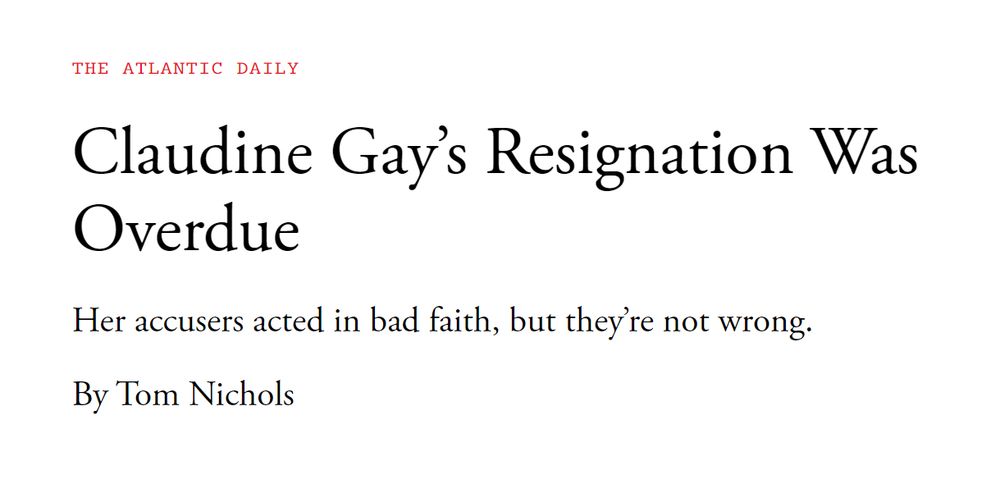This is my first post on Beehiiv’s platform. I like what I've seen so far, but I'm still learning the ropes. Given that, this is a bit of a jumble between the ideas I wanted to share and a bit of functionality tire-kicking…
I'm sure you heard that Harvard’s president resigned yesterday. I have zero interest in the bad-faith arguments put forth by bad-faith actors that got us here, but I am interested in pointing out bad-faith actors who call out others for their bad-faith acts, but then ultimately support their aims. Whether you want to call them quislings, simps, or double-dealers, Tom Nichols is one such person.
That Nichols went there is about as unsurprising as it gets, but Timothy Noah followed suit for TNR. In his post, Noah lamented being unable to call Gay’s ousting unfair. The paragraph below justifies his position.
In his post, Noah shared links to three anonymous complaints. The latest was the one delivered on January 1 that’s mentioned in the clip above. Since Noah didn’t provide direct evidence of his claim, I took a look at the doc. The clip below appears to include the ‘offending’ paragraph from Gay and the original from Canon. Given Noah’s claim, I expected the highlights to display a direct copy/paste.
I don’t see how Noah found the “game over” here. As he notes, Canon is cited in the Bibliography, and Gay has admitted to making errors in attribution. She explained that she asked to have those corrected in a new essay for the NYT.
Most recently, the attacks have focused on my scholarship. My critics found instances in my academic writings where some material duplicated other scholars’ language, without proper attribution. I believe all scholars deserve full and appropriate credit for their work. When I learned of these errors, I promptly requested corrections from the journals in which the flagged articles were published, consistent with how I have seen similar faculty cases handled at Harvard.
Writing, editing, and attribution are messy endeavors. When I write, I try to go overboard with refs to give credit where it’s due and avoid trouble, but it’s not a cut-and-dried thing. In my experience, writers and editors can vary greatly in their opinions about what needs to be cited, and I’ve filled essays with refs/links just to see many of them removed before they go up. (Send traffic elsewhere? Perish the thought!)
Writers make mistakes. As a human being working to integrate ideas from a variety of sources, it is really easy to slip up. I’m certain that if someone took a fine-tooth comb to my writing, they’d find snags. I’d feel embarrassed, apologize, and correct the error. I would not expect to have to resign from a role for doing so, nor do I think Gay should have been asked to do so, but Noah pointed at those three sentences as he endorsed the removal of the black woman who had been leading Harvard.
More importantly, I’m left with questions about the context of the clip in question. The context we have is that which was presented by the anonymous person making the complaint. We are all judging Gay’s work based on the context provided by someone who is taking part in an effort that both Nichols and Noah called out as being bad faith. Does that seem like a good idea?
The reason people are discussing this is that bad-faith actors worked to manufacture controversy and the media were either unwitting or willing accomplices. They shit the bed and now Rufo is offering bounties for people to go after more academics.

We are now in a very bad place.





